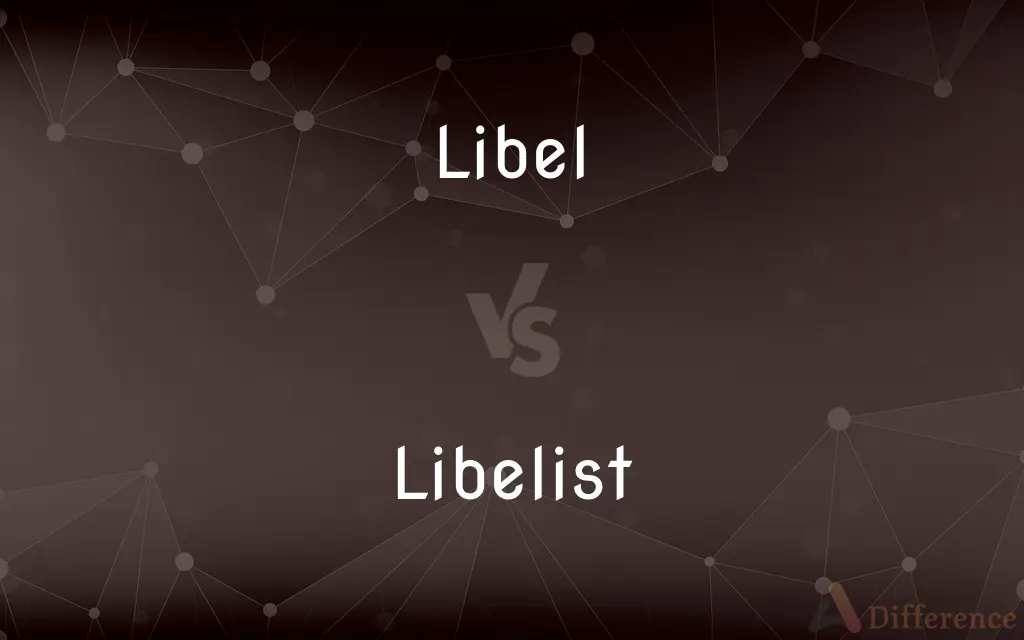Libel vs. Libelist — What's the Difference?
By Maham Liaqat & Fiza Rafique — Updated on May 19, 2024
Libel refers to a written or published false statement that damages someone's reputation. A libelist is a person who makes or publishes such a defamatory statement.

Difference Between Libel and Libelist
Table of Contents
ADVERTISEMENT
Key Differences
Libel is a legal term referring to defamation in written or published form, harming someone's reputation. A libelist, on the other hand, is an individual who commits the act of libel. This person is responsible for creating or disseminating the defamatory content. If a journalist writes a false and damaging article about someone, the journalist is the libelist.
Libel often requires the plaintiff to prove that the statement was false, damaging, and made with negligence or malice. In contrast, identifying a libelist involves pinpointing who authored or published the defamatory statement. This is crucial in legal proceedings to hold the correct party accountable.
The impact of libel can be severe, leading to lawsuits, financial penalties, and damage to reputations. Meanwhile, the libelist faces legal repercussions, potential job loss, and social stigma. Both terms are intertwined but focus on different aspects of the defamation process: libel on the act, and libelist on the actor.
In legal contexts, proving libel involves demonstrating that the defamatory statement was communicated to a third party. A libelist's actions are scrutinized to establish their responsibility in spreading the libelous content. This differentiation helps in assigning appropriate legal consequences.
Comparison Chart
Definition
Written or published defamatory statement
Person who makes or publishes libel
ADVERTISEMENT
Medium
Tangible (print, online)
Individual involved in creating/disseminating
Legal Focus
Act of defamation
Author or publisher of the defamation
Proof Required
False, damaging, and made with negligence/malice
Responsibility for the libelous content
Consequences
Lawsuits, financial penalties, reputation damage
Legal repercussions, job loss, stigma
Compare with Definitions
Libel
Written defamation.
The magazine was sued for libel after publishing false accusations.
Libelist
Author of libel.
A known libelist, she frequently wrote damaging stories.
Libel
Published falsehood.
The online post was considered libel by the court.
Libelist
Publisher of falsehood.
The website's owner was a notorious libelist.
Libel
Defamatory content.
Libel can severely damage a person's reputation.
Libelist
Person who defames.
The journalist was labeled a libelist for the false report.
Libel
A published false statement that is damaging to a person's reputation; a written defamation
He was found guilty of a libel on a Liverpool inspector of taxes
Libelist
Creator of defamatory content.
The libelist faced multiple lawsuits.
Libel
(in admiralty and ecclesiastical law) a plaintiff's written declaration.
Libelist
The legally indefensible publication or broadcast of words or images that are degrading to a person or injurious to that person's reputation.
Libel
Defame (someone) by publishing a libel
The jury found that he was libelled by a newspaper
Libelist
An incidence of such publication or broadcast.
Libel
(in admiralty and ecclesiastical law) bring a suit against
If a ship does you any injury you libel the ship
Libelist
The written claims initiating a suit in an admiralty court.
Libel
The legally indefensible publication or broadcast of words or images that are degrading to a person or injurious to that person's reputation.
Libelist
To publish or broadcast a libel about (a person).
Libel
An incidence of such publication or broadcast.
Libelist
(rare) One who libels, a libeler.
Libel
The written claims initiating a suit in an admiralty court.
Libelist
A libeler.
Libel
To publish or broadcast a libel about (a person).
Libelist
Individual spreading libel.
The libelist's actions led to widespread backlash.
Libel
(countable) A written or pictorial false statement which unjustly seeks to damage someone's reputation.
Libel
(uncountable) The act or tort of displaying such a statement publicly.
Libel
(countable) Any defamatory writing; a lampoon; a satire.
Libel
A written declaration or statement by the plaintiff of their cause of action, and of the relief they seek.
Libel
(countable) A brief writing of any kind, especially a declaration, bill, certificate, request, supplication, etc.
Libel
To defame (someone), especially in a manner that meets the legal definition of libel.
He libelled her when he published that.
Libel
To proceed against (goods, a ship, etc.) by filing a libel claim.
Libel
A brief writing of any kind, esp. a declaration, bill, certificate, request, supplication, etc.
A libel of forsaking [divorcement].
Libel
Any defamatory writing; a lampoon; a satire.
Libel
A malicious publication expressed either in print or in writing, or by pictures, effigies, or other signs, tending to expose another to public hatred, contempt, or ridicule. Such publication is indictable at common law.
Libel
The crime of issuing a malicious defamatory publication.
Libel
A written declaration or statement by the plaintiff of his cause of action, and of the relief he seeks.
Libel
To defame, or expose to public hatred, contempt, or ridicule, by a writing, picture, sign, etc.; to lampoon.
Some wicked wits have libeled all the fair.
Libel
To proceed against by filing a libel, particularly against a ship or goods.
Libel
To spread defamation, written or printed; - with against.
What's this but libeling against the senate?
[He] libels now 'gainst each great man.
Libel
A tort consisting of false and malicious publication printed for the purpose of defaming a living person
Libel
The written statement of a plaintiff explaining the cause of action (the defammation) and any relief he seeks
Libel
Print slanderous statements against;
The newspaper was accused of libeling him
Libel
Printed slander.
The author faced a libel lawsuit for the book's contents.
Libel
Harmful statement.
Libelous articles can lead to significant legal issues.
Common Curiosities
What must be proven in a libel case?
Plaintiffs must prove the statement was false, damaging, and made with negligence or malice.
How does libel differ from slander?
Libel involves written or published defamation, while slander involves spoken defamation.
Can a person be sued for libel?
Yes, individuals or entities can be sued for publishing false and damaging statements.
Can companies be sued for libel?
Yes, companies can be sued for libel if they publish false and damaging statements.
How can one defend against a libel accusation?
Defenses include proving the statement was true, made without malice, or was an opinion.
Who can be considered a libelist?
Anyone who authors or publishes a defamatory written or published statement can be considered a libelist.
Is libel a criminal offense?
Libel is typically a civil offense, but in some jurisdictions, it can also be a criminal offense.
What is libel?
Libel is a written or published false statement that harms someone's reputation.
Who is a libelist?
A libelist is a person who makes or publishes a defamatory written or published statement.
What are the consequences of committing libel?
Consequences can include lawsuits, financial penalties, and damage to one's reputation.
Can a libelist face criminal charges?
Depending on the jurisdiction, a libelist may face criminal charges alongside civil penalties.
What is the role of intent in libel cases?
Intent, such as malice or negligence, often needs to be proven in libel cases.
What is the impact of libel on social media?
Libel on social media can spread quickly and widely, leading to significant legal and reputational consequences for the libelist.
Is repeating a libelous statement also libel?
Yes, repeating a libelous statement can be considered libelous as well.
Can public figures sue for libel?
Yes, but they must often meet a higher standard of proof, showing actual malice.
Share Your Discovery

Previous Comparison
Purlins vs. Battens
Next Comparison
Onery vs. OrneryAuthor Spotlight
Written by
Maham LiaqatCo-written by
Fiza RafiqueFiza Rafique is a skilled content writer at AskDifference.com, where she meticulously refines and enhances written pieces. Drawing from her vast editorial expertise, Fiza ensures clarity, accuracy, and precision in every article. Passionate about language, she continually seeks to elevate the quality of content for readers worldwide.
















































